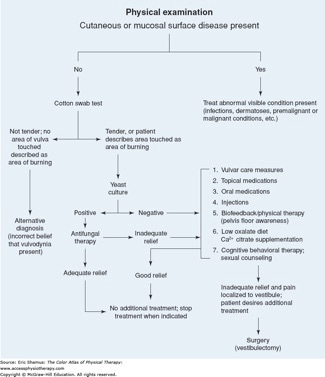Vulvodynia

Scenario: A 34-year-old woman reports that she has been experiencing burning pain at the opening of the vagina during intercourse for the past several months. Prior to this onset, she was able to have pain-free intercourse with her husband of 10 years. The symptoms started after she used an over-the-counter anti-fungal cream to self-treat what she thought was a yeast infection. Lately, when she attempts intercourse the burning pain is severe and she feels that she cannot allow vaginal penetration for intercourse.
Question: How would this presentation of vulvodynia be classified? What are some important prognostic factors for this pathology?
Potential answers:
- Provoked. Intensity of symptoms and psychological factors.
- Mixed. Length of time without treatment and presence of comorbidities.
- Unprovoked. Intensity of symptoms and presence of infection.
- Mixed. Age and duration of symptoms.
Answer with rationale: Provoked. Intensity of symptoms and psychological factors.
This presentation is classified as provoked due to the subjective information given regarding onset. The patient states that onset is typically instigated by sexual intercourse, and does not mention symptoms at other times. Follow up questions would be required for diagnosis.
There are three main prognostic factors for vulvodynia: duration of symptoms, intensity of symptoms, and the presence of psychological factors including fear avoidance behaviors and pain catastrophizing. The more intense the symptoms, the longer the duration, and the more psychological factors present, the worse the prognosis.

For more information see Chapter 264 Vulvodynia in the Color Atlas of Physical Therapy
Create a Free MyAccess Profile
AccessMedicine Network is the place to keep up on new releases for the Access products, get short form didactic content, read up on practice impacting highlights, and watch video featuring authors of your favorite books in medicine. Create a MyAccess profile and follow our contributors to stay informed via email updates.